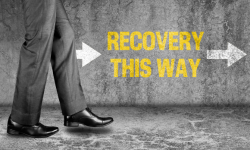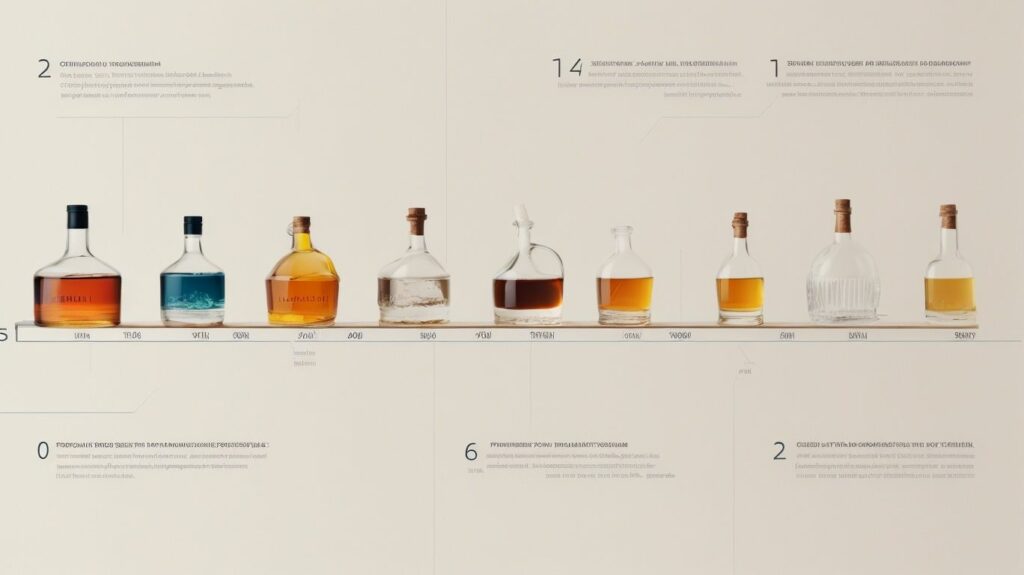20+ Years Experience
Specialist Alcohol Help

In today’s world, addiction has become a prevalent issue, affecting millions of lives and tearing families apart.
The 12-Step Alcohol Addiction Treatment Programme, created by Alcoholics Anonymous (AA), has offered a beacon of hope to many who struggle with addiction.
This blog post will delve into the secrets of this renowned programme, exploring its key components, success rates, and variations, as well as alternatives for those seeking a different approach to recovery.
The 12-Step Addiction Treatment Programme is a widely utilised approach to addiction recovery, emphasising personal growth, accountability, and support from others.
Introduced by the founders of Alcoholics Anonymous, the 12 steps provide guidance for individuals seeking to achieve sobriety and overcome all these defects.
The programme is based on a set of six spiritual awakening principles, offering individuals a pathway to recovery from the devastating consequences of alcohol and substance abuse.
While the 12 Step model was initially developed by AA, it has since been adopted by numerous other addiction treatment organisations, such as Narcotics Anonymous (NA) and Gamblers Anonymous (GA).
These step programs have helped countless individuals overcome addiction and maintain sobriety by fostering a supportive community and promoting self-reflection.
The 12 Steps are not a one-size-fits-all solution; they can be tailored to suit individual beliefs and needs, making it a more personalised approach to recovery.
The 12 Steps outline a structured path to recovery, emphasising honesty, humility, and making direct amends.
These guidelines were first introduced in the 1939 book titled Alcoholics Anonymous: The Story of How More Than One Hundred Men Have Recovered from Alcoholism, which emphasises the importance of conscious contact with a higher power.
Step 5, for example, encourages individuals to candidly confess to God, to oneself, and to aa group or another individual the exact nature of one’s transgressions, ensuring that any wrong promptly admitted is addressed.
In addition to the 12 Steps, the programme also includes the Twelve Traditions, which provide guidance to the members of Alcoholics Anonymous as a collective.
The initial tradition stipulates that collective well-being should be prioritised, and personal recovery depends upon AA solidarity.
These guiding principles and practices help individuals maintain abstinence from substances of abuse and their self-help fosters spiritual progress.
Sponsorship plays a crucial role in 12 Step programmes, offering guidance and support from someone who has already experienced the recovery process.
A sponsor provides assistance with navigating membership, answering questions, working on the 12 steps, and offering accountability. They act as a confidant and mentor in working the twelve steps and living life sober.
The concept of a higher power is a key aspect of the 12-Step Programme, assisting individuals in surrendering and attaining and sustaining abstinence from substances of abuse.
The role of a higher power can be interpreted in various ways, accommodating both religious and non-religious individuals.
This flexibility allows the 12-Step Programme to resonate with a wider audience, providing support and guidance to many who struggle with addiction.
12 Step Programmes foster a supportive community and encourage self-reflection, aiding individuals in maintaining sobriety and developing healthy coping mechanisms.
Building a sober network through 12 Step meetings provides accountability and encouragement during the recovery process. Furthermore, personal inventory and reflection are essential components of the 12 Steps, promoting self-awareness and growth.
In addition to the supportive elements of the 12-Step Programme, its integration into comprehensive addiction treatment plans can enhance the effectiveness of therapy, medication, and other recovery strategies.
By combining the 12 Steps with other evidence-based treatments, individuals can receive a well-rounded approach to overcoming addiction and maintaining long-term recovery.
Building a sober network through 12 Step meetings is an integral aspect of addiction recovery. These meetings provide the “fellowship” element of Alcoholics Anonymous mutual support groups, where such people congregate and exchange their experiences.
It is estimated that there are approximately 115,000 Twelve-Step groups worldwide, providing support to over 2.1 million members.
With the help of Alcoholics Anonymous World Services, these meetings continue to be a vital resource for those seeking sobriety.
It is recommended to attend 90 meetings within 90 days of AA membership or at least one meeting a day for three months.
This level of commitment not only fosters a strong support group and system but also helps individuals maintain abstinence and cultivate a substance abuse-free lifestyle, effectively managing all our affairs.
Building a sober network is crucial to long-term recovery, as it provides accountability, encouragement, and guidance from others who have successfully navigated the recovery process.
Personal inventory and reflection involve a process of self-examination and self-awareness, which are essential components of the 12 Steps.
By taking an honest and thorough look at one’s thoughts, feelings, and behaviours, individuals can gain a better understanding of themselves and their relationships with others.
Undertaking a searching and fearless moral inventory is a crucial part of addressing personal challenges and finding solutions that align with individual values and beliefs in the 12 Step journey.
The advantages of personal inventory and reflection include enhanced self-awareness, improved relationships with others, and a heightened comprehension of one’s motivations and behaviours.
Additionally, this process can assist individuals in pinpointing areas of their lives that require attention in order to attain sobriety and recovery.
By fostering self-awareness and growth, the 12 Steps provide a spiritual foundation both for lasting change and long-term recovery.
12 Step interventions and mutual support groups have been shown to be effective in helping individuals achieve and maintain sobriety.
Self-report information collected by AA, NA, and CA indicates a median length of abstinence among currently-attending members of five years, with approximately one-third of members reporting remaining abstinent between one and five years and 95% of the time. These success rates are further supported by more formal research.
It is important to note, however, that the success rates of 12 Step Programmes may vary depending on personal commitment and individual circumstances.
Factors such as the level of dedication to the step work, the individual’s unique needs and beliefs, and the availability of additional support resources can all impact the effectiveness of the 12-Step Programme for a particular person.
Nevertheless, the 12 Steps have proven to be a valuable tool for countless individuals seeking to overcome addiction and maintain long-term recovery.
The 12-Step Programme can be adapted to suit individual beliefs and needs, allowing for a more personalised approach to recovery.
Customising the programme involves focusing on personal inventory and reflection, constructing a sober network, and investigating spirituality and higher power.
By adjusting the programme to align with an individual’s unique convictions and requirements, the 12 Steps can be made more effective and easier to adhere to.
Tailoring the 12-Step Programme to individual needs not only fosters greater comprehension and participation but also enhances the efficacy and ease of adherence.
Additionally, it can decrease the likelihood of relapse, as individuals are more likely to stay committed to a programme that resonates with their personal values and beliefs.
This personalised approach to recovery can be a vital component of successful, long-term sobriety.
The concept of a higher power is a key aspect of the 12-Step Programme and can be interpreted in various ways, accommodating both religious and non-religious individuals.
The language within the 12 Steps emphasises the presence of God as each participant understands God, thus allowing for a variety of interpretations and religious beliefs.
This inclusive approach can lead to a spiritual awakening for many individuals on their his or her journey through the program.
Spirituality and religion can be incorporated into the 12-Step Programme through the joining of a spiritual or religious group or by engaging in prayer and meditation.
By allowing for diverse interpretations of the higher power concept, the 12-Step Programme can cater to a wide range of individuals, providing support and guidance to many who struggle with addiction.
Throughout the 12 Step journey, individuals may encounter various obstacles, such as establishing new relationships and managing complex emotions without the use of substances.
Transitioning from treatment, coping with difficult emotions, combating cravings, resolving relationship issues, addressing financial difficulties, combating loneliness, managing boredom, and managing mental health issues.
Identifying all these defects and obstacles and formulating strategies to overcome them is essential for addressing personal challenges in the 12 Step journey.
Measures that can be taken to address personal challenges include consulting a professional, participating in support groups, and engaging in self-care activities.
By identifying solutions that align with their individual values and beliefs, individuals can overcome these obstacles and continue on their path to recovery.
This process of addressing personal challenges and finding solutions is crucial for successful, long-term sobriety.
Integrating the 12 Step Programme into a comprehensive addiction treatment plan can enhance the effectiveness of therapy, medication, and other recovery strategies.
By incorporating the 12 Steps into individual and group therapy sessions, as well as providing access to 12-Step meetings and sponsors, individuals can receive a well-rounded approach to overcoming addiction and maintaining long-term recovery.
A comprehensive model of care is offered to support clients throughout their rehabilitation journey and to provide them with resources to sustain their recovery in the long term.
Combining the 12 Steps with other evidence-based treatments, such as cognitive-behavioural therapy, motivational interviewing, and mindfulness-based relapse prevention, can provide individuals with a holistic approach to addiction recovery that addresses their unique needs and circumstances.
Variations of the 12-Step Programme have been developed to address different types of addiction and cater to diverse cultural and religious backgrounds.
These adaptations allow the 12-Step Programme to accommodate the unique needs of individuals in recovery, providing a more inclusive approach to addiction treatment.
Examples of 12 Step Programme variations include Narcotics Anonymous (NA), which focuses on drug addiction, and Gamblers Anonymous (GA), which addresses problem gambling.
By tailoring the 12-Step Programme to suit the specific needs of individuals struggling with various forms of addiction, these variations provide a valuable resource for those seeking guidance and support in their recovery journey.
For those who may not resonate with the 12-Step philosophy, alternative addiction recovery programmes are available, such as SMART Recovery and Moderation Management.
These programmes offer different approaches to addiction recovery and may be more suited to individuals who prefer a secular or self-empowering method of treatment.
SMART recovery, for example, emphasises the individual’s capacity to take command over their addiction treatment and recovery, whereas the 12-Step model advocates for surrender.
Moderation Management, on the other hand, is an AA member who assists individuals in either moderating their alcohol consumption or abstaining altogether.
Exploring these alternatives can provide additional options for individuals seeking a recovery programme suggested a program that aligns with their personal beliefs and preferences.
The 12 steps in the recovery process, as defined by Alcoholics Anonymous, are admitting powerlessness, believing in a Higher Power, turning one’s will and life over to God, taking a moral inventory, admitting wrongs, being ready to have wrongs removed, making and willing to make amends, continuing to take fearless moral inventory, praying and meditating, using spiritual principles in relationships, seeking conscious contact with a Higher, conscious contact with god of Power, carrying the message, and growing spiritually.
These steps are designed to help individuals break free from the cycle of addiction and lead a healthier, more fulfilling life.
They provide a framework for understanding the process of recovery and the importance of spiritual principles in achieving sobriety.
By following these steps, individuals can gain insight into their own behaviour and learn how to make positive changes in their lives.
The 12-step program is not CBT; although they share similar goals of improving mental and emotional health, they are still distinct from one another.
The 12-Step Addiction Treatment Programme provides an individual with a structured pathway to recovery, promoting personal growth and accountability, with support from peers.
This programme is designed to help individuals identify and address the underlying causes of their addiction and to develop the skills and strategies needed to maintain long-term sobriety.
It also provides a supportive environment in which individuals can thrive.
The 12 Step Programme can be adapted to individual beliefs and needs by focusing on personal inventory and reflection, constructing a sober network, and exploring spirituality and higher power.
In conclusion, the 12 Step Addiction Treatment Programme has proven to be a valuable resource for countless individuals struggling with addiction.
Its emphasis on personal growth, accountability, and support from others, as well as its adaptability to individual beliefs and needs, make it an effective and inclusive approach to addiction recovery.
By integrating the 12-Step Programme into comprehensive addiction treatment plans and exploring alternative recovery models.
Individuals can find the right treatment approach that aligns with their unique circumstances and beliefs, ultimately setting them on a path to lasting sobriety and a fulfilling life.
There are a range of other services that we can provide. Have a look at the list below for more information:











































































































































We Aim To Reply To All Enquiries With-in 24-Hours